3. Efforts for Strengthening Partnerships
As Japan's development cooperation is carried out in partnership with diverse actors, a variety of institutional reforms and other improvements are made to maximize its effects. For development cooperation implemented by the government and its associated agencies, the government strives to strengthen collaboration between JICA and other agencies responsible for official funds such as JBIC, NEXI, the Japan Overseas Infrastructure Investment Corporation for Transport and Urban Development (JOIN), and the Fund Corporation for the Overseas Development of Japan's ICT and Postal Services (Japan ICT Fund). In addition, the government also endeavors to enhance mutually beneficial partnerships with various actors so as to serve as a catalyst for mobilizing and assembling a wide range of resources, including the private sector.
Furthermore, in order to ensure that a wide range of relevant organizations and people cooperate to promote Japan's efforts towards the achievement of the SDGs, the Government of Japan has established the SDGs Promotion Roundtable Meetings to accelerate the efforts on SDGs, with the aim of drawing on the collective wisdom of diverse stakeholders including the administrative sector, NGO/NPO, academia, private sector, international organizations, and various groups. The first “Japan SDGs Award” ceremony was held on the same day of the fourth meeting of the SDGs Promotion Headquarters organized by the Government of Japan in December 2017. By sharing good practices and initiatives by corporations and organizations, Japan is promoting the further efforts towards the achievement of the SDGs.
(1) Public-Private Partnership (PPP)
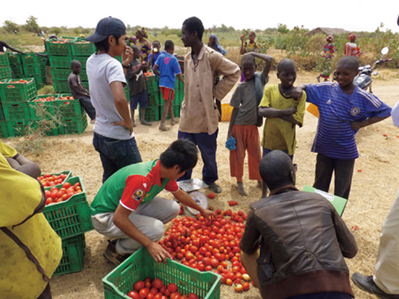
Tomato harvests in Senegal have increased through support by a Japanese company.
With the globalization of the economy, the inflow of private finance into developing countries currently exceeds the total amount of ODA. Therefore, it is increasingly important to promote the contribution of private finance to development in order to address the financing needs of developing countries.
Various operations conducted by Japanese private companies in developing countries can yield a range of benefits to these countries by creating local employment opportunities, augmenting tax revenue, expanding trade and investment, contributing to the acquisition of foreign currency, and transferring Japan's high-standard technology. Aiming to facilitate activities by these private companies in developing countries, in 2008, the government announced the Public-Private Partnership for Growth in Developing Countries, a new policy to strengthen partnerships between official funds such as ODA, and Japanese companies. Accordingly, the government accepts consultations and proposals from private companies regarding public-private partnership (PPP)* projects in which activities of private companies that are conducive to economic growth and poverty reduction in developing countries are coordinated with ODA.
Meanwhile, Corporate Social Responsibility (CSR) activities and Base of the Economic Pyramid (BOP) businesses* have been drawing increasing attention in recent years. CSR activities conducted by private companies aim to contribute proactively to solving the issues within the local communities in which they operate, while BOP businesses target low-income groups and are expected to contribute to improving livelihoods and solving social issues. In order to promote cooperation between the CSR activities and/or BOP businesses of Japanese private companies and the activities of local NGOs and other organizations, preferred slots were created within Grant Assistance for Grass-Roots Human Security Projects.* Japan also actively supports matching of private-sector actors to facilitate cooperation within the non-public sector, and authorized 20 such projects in FY2016.
In addition, the Government of Japan carries out PPP* that aims to implement projects of a highly public nature more efficiently and effectively through public-private cooperation. Japan provides assistance from the planning stage to the implementation of a project, such as institutional development and human resources development through technical cooperation, as well as utilizing Private-Sector Investment Finance (PSIF) and ODA loans.
Furthermore, international organizations, such as UNDP and UNICEF, promote inclusive businesses* by Japanese companies on the basis of the organizations' extensive experience and expertise in developing countries.
A. Preparatory surveys for PPP infrastructure projects
In recent years, there has been a growing global trend to improve infrastructure through public-private partnership (PPP) aiming at further enhancing effectiveness and efficiency not only at the construction phase, but also in post-construction operation, maintenance and management in emerging and developing countries. For such PPP infrastructure projects, it is important to engage in PPP from the initial stages of project formulation in order to share roles between the public and private sectors. As such, JICA supports the formulation of business plans by calling for proposals widely from private companies that are planning to participate in infrastructure projects intended to utilize PSIF or ODA loans, and entrusting feasibility surveys* to the companies proposed. Since the launch of the program in 2010, JICA has selected 70 projects in various fields such as water resource, urban development, natural resources and energy, and transportation (as of the end of November 2017).
B. Surveys for problem-solving businesses in developing countries (SDGs businesses)
In order to bring countries out of poverty and realize sustainable development, greater emphasis has been placed on linkages among various stakeholders, and contribution of private companies is expected in this regard. Thus, JICA launched “Preparatory Survey for BOP Business Promotion” in 2010, with the aim of developing BOP businesses based on proposals from private companies. By 2016, JICA has selected 114 BOP business promotion proposals. Furthermore, in response to the formulation of the SDGs by the UN in recent years, the target of the projects has been expanded from BOP businesses to SDGs businesses that contribute to the achievement of SDGs in developing countries, which is a more comprehensive challenge. This was launched in 2017, and JICA has selected nine proposals to date.
C. Collaboration Program with the Private Sector for Disseminating Japanese Technology for the Social and Economic Development of Developing Countries
This private sector proposal-type program aims to deepen the understanding of excellent products, technologies, and systems of Japanese companies, as well as to examine the feasibility of their application to the development of developing countries, through training in Japan and locally-held seminars primarily for government officials from developing countries. JICA calls for proposals from private companies, and entrusts the implementation of selected projects to the companies that make the proposals. As a result, the projects and the private companies' subsequent execution of the projects contribute to resolving challenges of developing countries. At the same time, private companies can expect positive effects such as increased awareness of their company's technologies, products, and systems in the recipient country, as well as detailed execution of businesses of a highly public nature, and networking with government officials in developing countries. Since the launch of the program in 2013, 94 projects have been selected (as of December 2017).
D. Partnership with Japanese small and medium-sized enterprises (SMEs)
Incorporating the rapid economic growth of emerging and developing countries is of crucial importance for the future growth of the Japanese economy. In particular, although Japanese SMEs possess numerous world-class products and technologies, many businesses have been unable to take the steps for overseas business expansion due to insufficient human resources, knowledge, or experience. On the other hand, it is expected that such products and technologies of Japanese SMEs and other entities will be useful for the socio-economic development in developing countries.
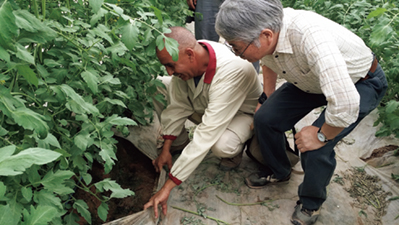
Site of verification experiment (cultivation of agricultural crops). Refer to “ODA Topics”. (Photo: Tottori Resource Recycling Inc.)
In response to these circumstances, MOFA and JICA proactively support the overseas business expansion of Japanese SMEs and other entities through ODA. Specific examples include: surveys for collecting basic information and formulating project plans necessary for the overseas business of SMEs and other entities that contribute to resolving the issues of developing countries, based on proposals from SMEs (Promotion Survey); surveys for studying the feasibility of utilizing SMEs' products or technologies in government projects and ODA projects in recipient countries (Feasibility Survey with the Private Sector for Utilizing Japanese Technologies in ODA Projects); and surveys for verifying ways to enhance products or technologies' compatibility with developing countries and disseminating them, based on proposals from SMEs (Verification Survey with the Private Sector for Disseminating Japanese Technologies).
These projects aim to achieve both the development of developing countries and the vitalization of the Japanese economy by utilizing the excellent products and technologies of Japanese SMEs. From FY2012 to FY2017, 666 SMEs' surveys and Verification Surveys were selected. As a result, questionnaire surveys to companies on 296 projects which have completed Promotion Surveys, Feasibility Surveys, and Verification Surveys by the end of May 2017, indicate that approximately 80% of companies with the effective response have ongoing overseas activities in the relevant countries.
As participating companies, business organizations and others have expressed many requests for further expansion of such efforts, MOFA and JICA continue to proactively support the overseas business expansion of SMEs and other entities through ODA.
Furthermore, MOFA provides grant aid (provision of equipment using SMEs' products) to support the overseas expansion of SMEs and other entities. By providing Japanese SMEs' products based on the requests and development needs of developing country governments, MOFA supports not only the socio-economic development of developing countries, but also the overseas business expansion of Japanese SMEs by raising the profile of the SMEs' products and creating sustained demand for them.
In addition, in order to assist in the development of global human resources required by SMEs and other entities, the Government of Japan established the “Private-Sector Partnership Volunteer System”* in 2012, in which employees from companies are dispatched to developing countries as Japan Overseas Cooperation Volunteers (JOCV) or Senior Volunteers (SV) while keeping their affiliation with their companies. Through this system, Japan proactively supports companies to expand their businesses overseas.
Similarly, the Ministry of Economy, Trade and Industry (METI) supports human resources development by accepting trainees in Japan and dispatching experts overseas, in order to foster local human resources necessary for overseas expansion of Japan's SMEs. Through these activities, METI provides technical cooperation to boost the economic growth of developing countries by harnessing the strengths of private companies.
•India
Feasibility Survey for Pre-Cast Concrete Products to Accelerate Social Infrastructure Development
Support for Japanese Small and Medium-sized Enterprises (SMEs) Overseas Business Development (Project Feasibility Survey) (June 2015 - May 2016)
With continued rapid urbanization, there is a growing demand for concrete structure for infrastructure development such as roadside gutters and river embankments, bridges and harbors due to frequent river floods in the rainy season that inundate roads and houses. Under these circumstances, four companies that are involved in the manufacturing of secondary concrete products, including Toyota Kohki Co., Ltd., carried out a feasibility survey in three cities in Maharashtra State, Gujarat State and National Capital Territory of Delhi, under JICA's Support for Japanese Small and Medium-sized Enterprises (SMEs) Overseas Business Development. The feasibility survey was aimed at responding to accelerating infrastructure development demand in Indian cities by utilizing Japanese precast concrete manufacturing technology to spread the use of concrete products for that infrastructure development. The term “precast concrete products” refers to concrete products that are “cast” by pouring concrete into molds in factories in advance. Since precast concrete products are manufactured according to designs in factories, the feature of the product is making it possible to build high quality infrastructure in a short term, simply by transporting the cast products to the construction site and installing them.
During the feasibility survey period, in January 2016, Fuji Concrete Industry Co., Ltd.'s Indian subsidiary Fuji Silvertech Concrete Private Limited, which jointly carried out the survey with Toyota Kohki Co., Ltd.'s Indian subsidiary Toyota Forms India Private Limited, completed constructing a local factory in the suburbs of Ahmadabad City, Gujarat State. The precast products that are manufactured using Japanese-made molds boast a level of versatility and quality that is top class even worldwide, with Toyota Kohki Co., Ltd.'s products at the top of the list.
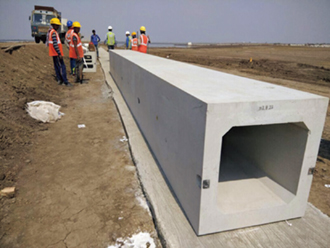
A precast product for drainage. The quality is equal to that of products in Japan, and it is highly regarded as a top-quality product in India.
The new factory has begun operating, and as a result of working with JICA to proactively introduce, at a local level, technologies for manufacturing precast concrete, which possesses strengths that include significantly shortening the construction period as well as flood prevention and earthquake-resistant properties, the businesses are also going to full-scale operation, including receiving orders for over 100 km of gutter projects. Furthermore, Toyota Kohki Co., Ltd. and Fuji Concrete Industry Co., Ltd.'s advances into the India market have been reported in concrete industry journals and newspapers in Japan. The dissemination of their products is contributing to establishing a social foundation in the form of infrastructure that supports the life of Indian people, particularly in cities, and also proves its usefulness for disaster risk management and countermeasures.
E. Grant aid for business/management rights
In FY2014, the Government of Japan introduced grant aid for business/management rights. It is extended to public work projects that comprehensively implement the continuum of activities from facility construction to operation, maintenance and management with the involvement of private companies. As such, this grant aid aims to facilitate the acquisition of business and management rights by Japanese companies and utilize Japan's advanced technologies and know-how for the development of developing countries. In FY 2016, this grant aid was provided for three projects; a project to address water leakages in Myanmar, a project to address medical waste in Kenya, and a project to expand water supply systems in Cambodia.
F. Improving Japan's ODA loans
In recent years, ODA loans are expected to provide Japan's advanced technologies and know-how to developing countries, and thereby improve people's living standards. At the same time, Japan seeks to use ODA loans to tap into the growth of emerging economies including those in Asia, which have particularly close relationships with Japan, and to contribute to the vitalization of the Japanese economy. In this regard, Japan will carry out further improvement of Japan's ODA loans to make them even more attractive to both developing countries and Japanese private companies.
In 2013, Japan re-categorized former priority areas into either “environment” or “human resources development,” and added “disaster risk reduction” and “health and medical care and services” as new priority areas. Additionally, it introduced the Special Terms for Economic Partnership (STEP) scheme to promote “Visible Japanese Development Cooperation” through the transfer of Japan's advanced technologies and know-how to developing countries, and improved the system by expanding the scope of application and lowering interest rates. At the same time, Japan has been taking additional measures such as the establishment of the Stand-by Emergency Credit for Urgent Recovery (SECURE).(Note 5) Furthermore, the Government of Japan introduced the Equity Back Finance (EBF) loan(Note 6) and the Viability Gap Funding (VGF) loan.(Note 7) These instruments are designed to support the development and application of various measures by recipient governments as needed, to promote the steady formulation and implementation of PPP infrastructure projects.
In 2014, Japan embarked on the full-fledged utilization of the “Sector Project Loan” that provides Japan's ODA loans comprehensively for multiple projects of the same sector, etc. Japan also further accelerated the implementation of its ODA loans by integrating the pre-qualification with project tender processes for Japan's ODA loan projects when Japanese companies' engagement are expected. In addition, Japan decided to introduce a new Contingent Credit Enhancement Facility for PPP Infrastructure Development (CCEF-PPP).(Note 8)
In 2015, the Government of Japan announced follow-up measures of the Partnership for Quality Infrastructure(Note 9) that would improve Japan's ODA loans and Private-Sector Investment Finance (PSIF) by accelerating Japan's ODA loan procedures and creating a new ODA loan scheme, among other measures. Specifically, the following measures are included: the government would reduce the period necessary for government-related procedures for Japan's ODA loans that normally require three years to approximately one and a half years at the most for important projects and to approximately two years at the most for other projects; on the condition that JICA's financial grounds are ensured, the government would introduce ODA loans with currency conversion option to countries that have income levels equal to or higher than those of middle-income countries as well as the establishment of dollar-denominated forms of Japan's ODA loans, Preferential Terms for High Specification, and Japan's ODA loans for business/management rights; the government would add “special contingency reserves” in the amount to be committed in Exchange of Notes (E/N); and in providing Japan's ODA loans directly to sub-sovereign entities such as local governments and public corporations of developing countries, the government would exempt the Government of Japan guarantee as an exception on a case-by-case basis at the Ministerial Meeting on Strategy relating to Infrastructure Export and Economic Cooperation if various conditions, including economic stability of recipient countries and sufficient commitment by recipient governments, are met. In addition, it was decided that the Government of Japan would implement pilot/test-marketing projects through grant aid, etc. In 2016, in the Expanded Partnership for Quality Infrastructure,(Note 10) the Government of Japan announced the further acceleration of Japan's ODA loan procedures, and decided to streamline the period between the initiation of the project feasibility study (F/S) and commencement of the construction work to one and a half years at the fastest, and aim for increased “visibility” of the term necessary for respective procedures.
G. Private-Sector Investment Finance (PSIF)
Private financial institutions are often reluctant to finance projects by private companies in developing countries for reasons including the high risk involved. In such situations, Japan uses JICA's PSIF* to directly invest in and provide loans for, and thereby assist the development projects by private companies in developing countries.
The Reorganization and Rationalization Plan for Special Public Corporations announced in 2001 stipulated that, in principle, no PSIF investments and loans would be made, except for projects authorized before the end of FY2001. However, due to the increased need to respond to new demand for funds for implementing high development impact projects through private-sector engagement, JICA resumed the provision of PSIF to private companies on a pilot basis. For example, PSIF has been provided for an industrial human resources development project in Viet Nam and a microfinance project for the poor in Pakistan since 2011.
JICA fully resumed PSIF in 2012. As of the end of FY2016, a total of 16 investment and loan agreements have been signed, including the Thilawa Special Economic Zone (Class A Area) Development Project in Myanmar. In order to reduce the exchange rate risk of Japanese companies participating in infrastructure projects overseas, the Government of Japan announced in succession the introduction of local currency-denominated PSIF (2014) and U.S. dollar-denominated PSIF (2015) for the PSIF scheme to supplement the existing yen-denominated PSIF. In 2015, the Government of Japan announced acceleration of PSIF, expansion of the coverage of PSIF, and strengthening of the collaboration between JICA and other organizations as follow-up measures of the Partnership for Quality Infrastructure. The measures set out that JICA would start its appraisal process, in principle, within one month after an application is filed by private companies, etc., while the standard period for JBIC to respond to inquiries on projects is to be two weeks. The measures also set out that the government is to enable JICA to co-finance with private financial institutions, while the government would review the requirement of the “no-precedent policy” and allow loans to be provided in cases where non-concessional loans by existing Japanese private financial institutions are impossible.
In 2016, in the Expanded Partnership for Quality Infrastructure, Japan decided to consider accommodating regulations on the largest share of equity allowed, such as the expansion of JICA's share of equity from 25% to 50% (the percentage should not make JICA the largest shareholder) for flexible operation and review of JICA PSIF, and to consider the possibility of Euro-denominated PSIF.
- *Public-Private Partnership (PPP) using ODA
- PPP is a form of public-private cooperation in which governmental ODA projects are conducted in collaboration with private investment projects. Input from private companies is incorporated from the stage of ODA project formation. For example, roles are divided between the public and private sectors so that basic infrastructure is covered with ODA, while investment and operation, maintenance and management are conducted by the private sector. The technologies, knowledge, experience, and funds of the private sector are then used in an effort to implement more efficient and effective projects as well as to improve development efficiency.
Areas for PPP: Water and sewerage systems, airport construction, motorways, railways, etc.) - *Base of the Economic Pyramid (BOP) business
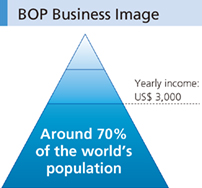
- BOP refers to businesses that are expected to be useful in resolving social issues for low-income groups* in developing countries. Accounting for approximately 70% of the world's population, or approximately 5 billion people, low-income groups are attracting attention as a market with potential for growth. It is expected that incorporating low-income groups into consumption, production, sales, and other value chains will be useful in providing sustainable solutions to a variety of local societal problems.
Examples: models that aim to improve nutrition through sales to the poor of nutrient-enhanced food for infants, models that aim to increase incomes by improving crop yields and quality through technical support related to high-quality mung bean cultivation for poor farmers, etc.
* Low-income group: The income bracket with an annual income per capita of $3,000 or less in purchasing power parity. Purchasing power parity is determined by removing differences between price levels to make purchasing power between different currencies equivalent. - *Grant Assistance for Grass-Roots Human Security Project
- This grant assistance provides the funds necessary for comparatively small-scale projects that directly benefit residents at the grass-roots level with the objective of realizing socio-economic development in developing countries, taking into account the philosophy of human security (as a general rule, the limit of provision amount is ¥10 million or less). The organizations eligible for this grant assistance are non-profit organizations such as the NGOs active in developing countries (local NGOs and international NGOs; however, organizations covered by Grant Assistance for Japanese NGO Projects are excluded), local public entities, educational institutions, and medical institutions. Projects in partnership with the companies and local governments of Japan are also actively recommended.
- *Inclusive business
- Inclusive business is a generic term for a business model advocated by the UN and the World Bank Group as an effective way to achieve inclusive market growth and development. It includes sustainable BOP businesses that resolve social challenges.
- *Feasibility survey
- Feasibility survey verifies whether a proposed project is viable for execution (realization), and plans and formulates a project that is most appropriate for implementation. The survey investigates a project's potential, its appropriateness, and its investment effects.
- *Private-Sector Partnership Volunteer System
- The Private-Sector Partnership Volunteer System is a system in which employees of SMEs and other entities are dispatched to developing countries as Japan Overseas Cooperation Volunteers (JOCV) or Senior Volunteers (SV), and contributes to the development of global human resources and overseas business expansion of the companies. The country of dispatch, occupation type, and duration of dispatch are determined through consultation based on the requests from companies and other entities. Volunteers are dispatched to countries in which their companies are considering business expansion. It is expected that the volunteers gain an understanding of the culture, commercial practices, and the technical level of their respective destination countries through the volunteering activities. They are also expected to acquire not only language skills but also communication skills, problem solving skills and negotiation skills, which will be brought back into corporate activities upon their return.
- *Private-Sector Investment Finance (PSIF)
- PSIF refers to one of JICA's loan aid schemes, which provides necessary investment and financing to private sector corporations and other entities, which are responsible for implementing projects in developing countries. The projects of private companies and other entities in developing countries create employment and lead to the revitalization of the economy. However, it is difficult to obtain sufficient financing from existing financial institutions in some cases, due to a variety of risks involved and the unlikelihood of high gains. PSIF supports the development of developing countries by providing investment and financing for businesses which are difficult to sustain by financing from private financial institutions alone, but are highly effective for development. The fields eligible for this assistance are: (i) infrastructure development and growth acceleration; (ii) SDGs and poverty reduction; and (iii) measures against climate change.
- Note 5: This is a mechanism under which Japan concludes international agreements for Japan's ODA loans in advance with developing countries that are potentially affected by natural disasters that occur in the future, enabling a swift lending of funds for recovery if a disaster does occur.
- Note 6: An EBF loan is provided for the equity investment made by the government of a developing country in the Special Purpose Company (SPC), the entity responsible for the public work project in the developing country, if a Japanese company is among the implementing parties of a PPP infrastructure project in which the government of a developing country, state enterprise, or other parties have a stake.
- Note 7: A VGF loan is provided to help finance the VGF that the developing country provides to the SPC, in order to secure the profitability expected by the SPC, if a Japanese company has a stake in a PPP infrastructure project implemented by the government of a developing country.
- Note 8: CCEF-PPP refers to loans that are provided based on the requests from SPCs to perform guarantee obligations, in order to encourage the government of a developing country to develop and utilize schemes that ensure the execution of off-take agreements, and thereby, promote PPP infrastructure development pursuant to appropriate risk sharing between the public and private sectors.
- Note 9: The pillars of the content of the Partnership for Quality Infrastructure are (i) Expansion and acceleration of assistance through the full mobilization of Japan's economic cooperation tools, (ii) Collaboration between Japan and ADB, (iii) Expansion of the supply of funding for projects with relatively high risk profiles by such means as the enhancement of the function of JBIC, and (iv) Promoting “Quality Infrastructure Investment” as an international standard.
- Note 10: The Expanded Partnership for Quality Infrastructure was announced by Prime Minister Abe at the G7 Ise-Shima Summit in May 2016. It incorporates the provision of financing of approximately $200 billion through Japan-wide efforts as the target for the next five years to infrastructure projects across the world, including Asia, at the same time aiming for further improvement of measures, and strengthening the institutional capacity and financial grounds of Japan's relevant organizations, including JICA.
(2) Partnership with Universities and Local Governments
Japan utilizes the practical experience and expertise accumulated by universities as well as local governments to implement more effective ODA.
A. Collaboration with universities
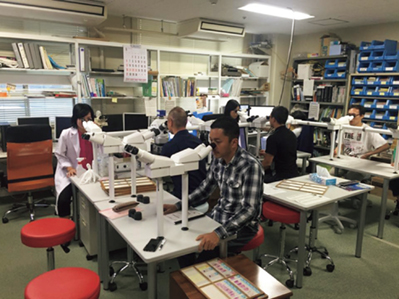
A trainee from Myanmar conducting research in the pathology doctoral course at the Nagasaki University School of Medicine (Photo: Nagasaki University School of Medicine)
Some of the roles of universities are: to contribute to the development of developing countries; to develop human resources that will be responsible for international cooperation; and to organize and disseminate the philosophy and theories of Japan's assistance. Taking these roles into account, Japan is promoting civil participation projects in cooperation with various universities, including technical cooperation, ODA loan projects and JICA Partnership Program (JPP), with the aim of broad intellectual cooperation regarding all aspects of the cycle of assistance, from organizing the theories of assistance to putting it into practice and giving back to the Japanese people through education.
For example, with the objective of developing advanced human resources who will be the core of socioeconomic development in developing countries, Japan utilizes the JICA Project for Human Resource Development Scholarship (JDS) to accept young officials, etc. from developing countries as international students in a cumulative total of 36 universities. In FY2016, 266 students were newly accepted.
Furthermore, under an initiative for the development of African industrial human resources through industry-academia-government cooperation (ABE initiative), 123 departments in 67 universities throughout Japan are accepting trainees. Moreover, Japan has implemented the ASEAN University Network/Southeast Asia Engineering Education Development Network (AUN/SEED-Net) Project* as a JICA technical cooperation project, in which Japan is working to strengthen the network among Japanese and ASEAN universities, collaborating with the industrial sector, and engaging in joint research with neighboring countries.
These kinds of cooperation contribute to the development of developing countries and also to the internationalization of Japanese universities.
B. Collaboration with local governments
Various kinds of know-how possessed by the local governments of Japan are necessary for the development of the economies and societies of many developing countries throughout the world. For example, against the remarkable growth and urbanization of developing countries in recent years, responses to environmental issues and infrastructure issues have not been keeping up with the pace of growth. Therefore, the cooperation of the local governments of Japan, which have accumulated rich expertise in the fields of water, energy, waste disposal, and disaster risk reduction, etc., is becoming increasingly necessary. For this reason, Japan has promoted the participation of local governments in ODA. Furthermore, from the viewpoint of the needs of the local governments, Japan is actively promoting the overseas expansion of local governments in order to stimulate the revitalization and globalization of the local regions of Japan.
In FY2016, Seminars on Collaboration between Local Governments were held 15 times with the objectives of enhancing the potential of the local governments, etc. that will participate in development and international cooperation in developing countries, and thereby revitalizing the regions through internationalization, promotion of industry, etc. This is achieved through the sharing of the experience, know-how, networks, etc. of local governments that have overseas expansion experience with other local governments and local companies including SMEs, and deepening their collaboration. In FY2017, the Government of Japan has been engaged in further efforts to promote overseas expansion by enriching the contents of the seminars so as to enable even more personnel to learn about the appeal of implementing projects overseas and know-how of the field.
In 2015, the Government of Japan launched grant aid projects (local public entities proposal types), and adopted the “Project for Trenchless Sewerage Pipe Rehabilitation in Ho Chi Minh City” in Viet Nam proposed with some conditions by Osaka City in FY2015, and the “Septic Tank Sludge Treatment Construction Project for Metro Cebu” in the Philippines proposed by Yokohama City in FY2016. In 2016, the Government of Japan established the Grant Assistance for Grass-Roots Human Security Projects in collaboration with local governments, and set preferred slots in order to actively adopt projects that encourage the local governments of Japan to collaborate with local NGOs and public entities, etc. in the recipient countries. Since then, Japan has been actively supporting matching them. Through these various initiatives, Japan is further promoting cooperation with local governments.
- *ASEAN University Network/Southeast Asia Engineering Education Development Network (AUN/SEED-Net)
- AUN/SEED-Net was launched in 2001 as a university network comprising 26 top-ranking engineering universities in 10 ASEAN member countries, and 14 partner universities from Japan. It implements various research and education activities to produce advanced human resources in the engineering sector, with the aim of realizing sustainable development in Southeast Asia and Japan. This initiative is implemented with support from the Government of Japan through JICA, in cooperation with the governments and universities of Southeast Asia and Japan.
(3) Partnership with Civil Society
In the current international community, a wide range of actors, including private companies, local governments and non-governmental organizations (NGOs) are playing a bigger role in finding solutions to development challenges and achieving high quality of growth in developing countries. In this regard, collaboration with civil society centered around NGOs is essential from the viewpoint of deepening public understanding and participation in development cooperation, and further expanding and strengthening social foundations that underpin such cooperation.
A. Direct participation in assistance to developing countries through the Japan Overseas Cooperation Volunteers (JOCV) and Senior Volunteers (SV)
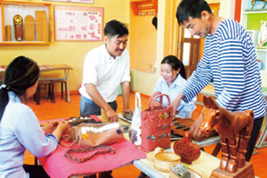
Mr. Keitaro Taniguchi, a Japan Overseas Cooperation Volunteer (JOCV), providing guidance on making leather and fabric handicraft products at a vocational training school in Mongolia (in the center of the photo) (Photo: Keitaro Taniguchi)
Founded in 1965 and marking its 50th anniversary in 2015, the Japan Overseas Cooperation Volunteers (JOCV) program has dispatched approximately 40,000 people to 88 countries in total, contributing to the development of developing countries as a good example of “Visible Japanese Development Cooperation.” The JOCV program dispatches skilled Japanese people between the ages of 20 and 39 to developing countries, while the Senior Volunteers (SV) program dispatches people between the ages of 40 and 69 with a wide range of skills and a wealth of experience to developing countries. Under these public-participation-type programs, the volunteers stay in developing countries in principle for a two-year-term to assist economic and social development in the countries, while living and working as volunteers with local residents.
These volunteer programs contribute not only to the economic and social development of the relevant countries, but also to deepening local people's affinity for Japan, thereby strengthening mutual understanding and friendship between Japan and these countries. Additionally, in recent years, the programs have drawn attention in the respect that the volunteers return their experiences to the society. For example, some returned volunteers contribute to business expansion of Japanese private companies in developing countries.
In order to promote these initiatives, the Government of Japan has been putting effort into making it easier for people to take up positions in these volunteer programs through supporting returned volunteers in pursuing their careers further, and disseminating information on participation in the programs by taking advantage of career breaks.*
- *Participation in the volunteer programs by taking advantage of career breaks
- Those who are currently working at companies, national or local governments, or schools can participate in the JOCV program and SV program by taking advantage of such arrangements of career breaks and a waiver of duty of devotion to service, thereby remaining affiliated with their organizations.
B. Assistance to NGOs and participation in NGO activities
Japanese NGOs implement high-quality development cooperation activities in various fields including education, medical care and health, rural development, refugee assistance, and technical guidance on landmine and unexploded ordnance (UXO) clearance in developing countries and regions. They also provide prompt and effective emergency humanitarian assistance in sites affected by conflict or natural disasters such as earthquakes and typhoons. Thus, Japanese NGOs are attuned to different local situations in developing countries and are able to carefully tailor responses to the assistance needs of the local people. Accordingly, Japanese NGOs can provide assistance at the grassroots level by reaching out to local needs that are difficult to address through assistance from governments and international organizations. Furthermore, MOFA regards Japanese NGOs that embody “Visible Japanese Development Cooperation” as indispensable partners in development cooperation, and therefore attaches importance to collaborating with NGOs. Specifically, MOFA: (i) provides financial support for the development cooperation activities of NGOs; (ii) provides support for the capacity building of NGOs; and (iii) engages in dialogues with NGOs.
In addition, under the Development Cooperation Charter, MOFA and NGOs have jointly developed a plan outlining the direction of their collaboration over the next five years and announced the plan in 2015. Subsequently, MOFA has been following up on this plan with NGOs annually, releasing an FY2016 progress report for the plan in June 2017.
C. Financial cooperation for NGO projects
The Government of Japan cooperates in a variety of ways to enable Japanese NGOs to smoothly and effectively implement development cooperation projects and emergency humanitarian assistance projects in developing countries and regions.
■Grant Assistance for Japanese NGO Projects
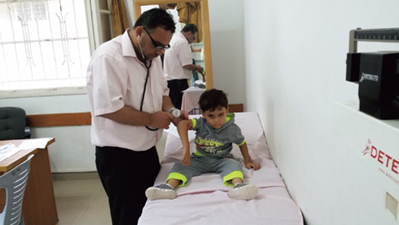
Medical examinations are given to improve nutrition of child victims in Palestine. Refer to the column for details. (Photo: Campaign for the Children of Palestine)
MOFA provides financial support for the socio-economic development projects that Japanese NGOs implement in developing countries through the Grant Assistance for Japanese NGO Project scheme. In FY2016, 54 organizations utilized this framework to implement 102 projects amounting to ¥4.35 billion in 29 countries and 1 region, in fields such as medical care and health, education and human resources development, vocational training, rural development, water resource development, and human resources development for landmine and UXO clearance.
■Japan Platform (JPF)
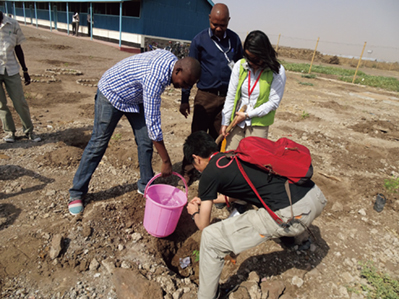
Staff from the JPF Secretariat planting trees in the elementary school established under JPF's program for the support of South Sudan in Kakuma refugee camp, Kenya (Photo: JPF)
Japan Platform (JPF), an emergency humanitarian aid organization, was established in 2000 through partnership among NGOs, the government, and the business community, and 47 NGOs are its members as of July 2017. JPF utilizes ODA funds contributed by MOFA as well as donations from companies and citizens to carry out emergency humanitarian assistance such as distribution of living supplies and livelihood recovery, when a major natural disaster occurs and a vast number of refugees flee from conflicts. In FY2016, JPF implemented 77 projects under 10 programs, including humanitarian assistance in Afghanistan, assistance for the humanitarian crisis in Yemen, assistance to refugees and IDPs in Iraq and Syria, humanitarian assistance in Gaza Strip in Palestine, assistance in South Sudan, and assistance towards Mongolia for snow damage.
■NGO Project Subsidies
MOFA provides subsidies to Japanese NGOs that conduct project formulation studies, post-project evaluations, and seminars and workshops in Japan and overseas for socio-economic development projects. The subsidies are provided at a maximum of ¥2 million up to half of the total project cost. In 2017, 12 organizations utilized these subsidies to implement activities such as project formulation studies, ex-post evaluations, and seminars and workshops both in and outside of Japan.
■JICA Partnership Program and other JICA activities
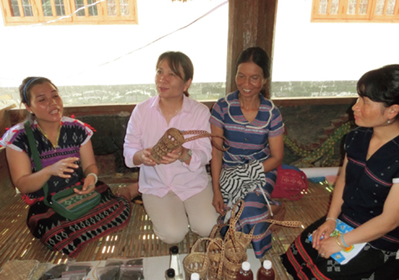
Specialty products for tourists developed in an ethnic minority village under the human resources development program for regional revitalization through resident-led efforts in the ethnic minority region of Nam Giang District in Viet Nam (Foundation for International Development/Relief) (Photo: JICA)
JICA's technical cooperation projects are outsourced to the private sector including Japanese NGOs in some cases, so as to make use of the expertise and experience of NGOs, universities, local governments, and a variety of other organizations. Furthermore, as part of its ODA activities, JICA conducts the JICA Partnership Program (JPP)* in which JICA entrusts projects proposed by Japanese NGOs, universities, local governments etc. that are related to cooperation activities directly assisting local residents in developing countries. In FY2016, a total of 260 projects were implemented in 51 countries in the world. (Note: Projects implemented in FY2016 for all assistance schemes.)
- *JICA Partnership Program (JPP)
- JPP is a part of the ODA programs in which JICA supports and jointly implements international cooperation activities for local residents in developing countries with Japanese NGOs, universities, local governments, and organizations including public interest corporations that have an interest in international cooperation activities.
JPP has three types of support schemes depending on the size and the type of the organization:
(i) Partner Type (Project amount not exceeding ¥100 million and to be implemented within five years)
(ii) Support Type (Project amount not exceeding ¥10 million and to be implemented within three years)
(iii) Local Government Type (Project amount not exceeding ¥30 million and to be implemented within three years. Project amount in the Special Category of Local Government Type not exceeding ¥60 million.)
D. Creation of an enabling environment for NGOs
Further measures to support Japanese NGO activities other than financial assistance include programs for establishing a better environment for NGO activities. The objective of these programs is to further strengthen the organizational arrangements and project implementation capabilities of Japanese NGOs, as well as develop their human resources. Specifically, MOFA carries out the following four programs.
■NGO Consultant Scheme
Under this scheme, MOFA commissions highly experienced NGOs in Japan (16 organizations were commissioned in FY2016) to address inquiries and respond to requests for consultation from the public and NGO workers, regarding international cooperation activities, NGO organizational management methods, and approaches for providing development education, etc. NGO consultants also make themselves available for free lectures and seminars at international cooperation events and other educational events, and provide opportunities for many people to enrich their understanding of NGOs and international cooperation activities.
■NGO Intern Program
The NGO Intern Program aims to open doors for young people seeking employment in international cooperation NGOs in Japan and to train them to contribute to Japan's ODA in the future. Through this program, MOFA seeks to expand the international cooperation efforts of Japanese NGOs and further strengthen the collaborative relations between ODA and NGOs. To this end, MOFA commissions international cooperation NGOs in Japan to accept and train interns, and pays for a certain amount of the training costs.
The NGOs that accept interns may apply to extend the internship duration for “new interns” hired for 10 months, by another 12 months as “continuing interns” for a maximum of 22 months of intern training. In FY2016, 10 interns were newly accepted into NGOs through this program.
•Honduras
The Project to improve living environment through youth development and community empowerment approach in the south-eastern part of Tegucigalpa
Grant Assistance for Japanese NGO Projects (March 2016 - February 2018)
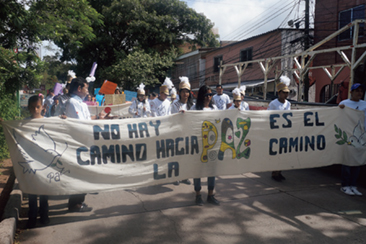
A community activity held in Hato de Enmedio, Tegucigalpa. A peace parade led by local residents was held to pray for peace in the community. (Photo: AMDA Multisectoral & Integrated Development Services)
Tegucigalpa, the capital of Honduras, is not safe enough. This situation stands as a serious impediment to the growth of the country as a whole. Moreover, the age of criminals is becoming much younger. The lack of security in daily life apparently has made it difficult for residents of the city to interact among them. Amidst this, AMDA Multisectoral & Integrated Development Services (AMDA-MINDS), a Japanese NGO, has undertaken projects for cultivating young people, who comprise a large percentage of both victims and perpetrators in the crimes committed in Tegucigalpa, and improving the community environment including safety.
AMDA-MINDS is working for prevention and countermeasure against crimes committed by youth, which is one of Honduras' biggest challenges, through improving local communities including youth. For example, the NGO is encouraging the formation of extracurricular clubs within schools on the subjects of sciences, music, and sports that may interest young leaders and other youth, and supporting these clubs. In addition, it also promotes community events modeled after Japanese local community activities. In May 2017, a soccer tournament planned by a community group was held under the slogan “Fostering friendship through sports and sharing healthy leisure time,” which aimed to serve as the first step towards restoring the community environment as a place for youth to enjoy sports in a healthy manner.
In addition, these communities are trying hard to make the activities sustainable in cooperation with local authorities including community police, which have garnered long-term support from Japan.
■NGO Overseas Study Program
The NGO Overseas Study Program covers the costs of the overseas training of mid-career personnel from Japan's international cooperation NGOs for a period of one to around six months, aiming at strengthening their organization through human resources development. The training is divided into two types: “Practical Training” through which participants will gain working experience at overseas NGOs or international organizations that have an excellent track record of international development projects and the relevant policy recommendations, in order to build up the participant's practical capabilities; and “Training Enrollment” through which participants enroll in fee-based programs offered by overseas training institutions, aiming at improving their expertise. Trainees can establish training themes flexibly based on the issues that their organizations are facing. Upon returning to Japan, trainees are expected to utilize the fruits of their training for their organizations' activities, and contribute to enhance the capabilities of Japanese NGOs as a whole by sharing information with other Japanese NGOs. In FY2016, 13 people received the training through this program.
•Iraq
Rehabilitation of School in Erbil, Republic of Iraq
Grant Assistance for Japanese NGO Projects (FY2016)
Repairs to schools were unable to be made in the Kurdistan Region of Iraq, many of which were damaged and in a dangerous condition, because of repeated conflicts and local economic crisis caused by a drop in oil prices. Students were forced to attend schools under inferior conditions of dark classrooms with broken lighting and toilets that would not flush. Furthermore, a large number of refugees and internally displaced persons flowed into the region, causing a dramatic increase of students, which in turn led to further deterioration of school facilities. Making schools secure and hygienic was an urgent issue.
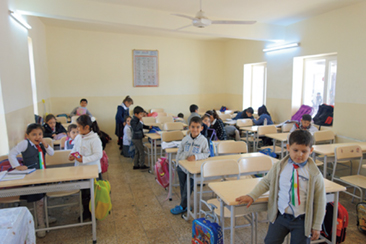
A classroom at Mam Elementary School whose walls and ceiling were repainted a brighter color (Photo: IVY)
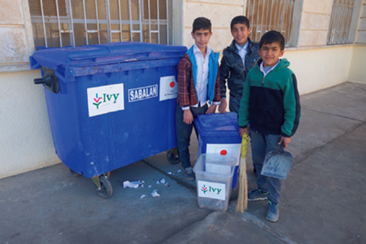
Elementary school students disposing of garbage at the designated location (Photo: IVY)
To address these issues, IVY, a Japanese certified non-profit organization, implemented a project to rehabilitate four deteriorated schools located in Iraq's Erbil Governorate. After the rehabilitation, the IVY held workshops for teachers in an effort to establish a school maintenance and management system.
This project enabled some 4,000 students to receive education in safe and hygienic conditions. A school principal of the school, which is located facing a road with heavy traffic, causing several students' death each year expressed his gratitude to a new gate that was built after the rehabilitation, saying that Japan's assistance saved students' lives. During the workshops, IVY introduced voluntary clean-up activities at schools by students in Japan, which attracted some teachers to introducing the same practice in Iraq, and finally led to students' engagement in clean-up activities in Iraq by using equipment provided by Japan. This illustrates that the project helped to change the mentality of teachers and students, too.
■NGO Study Group
MOFA supports Japanese NGOs in organizing study group meetings to build up the capabilities and expertise of NGOs. Specifically, NGOs that are commissioned to implement the program conduct studies, seminars, workshops (participatory lectures), and symposiums in cooperation with other NGOs. This program is designed for NGOs to strengthen their organizations and capacities by accumulating experience through the above activities and reporting or suggesting improvement policy in detail. In FY2016, study group meetings were held based on three themes: (i) “Creating Tools for Monitoring and Evaluating Sustainable Development Goals (SDGs) that the Whole NGO Sector Can Work With”; (ii) “Establishing Methods for Further Dissemination and Raising Awareness of International Standards on the Quality and Accountability through Development of Training Guidelines and Materials for Humanitarian Aid Workers”; and (iii) “Education Support for Fragile States and the Role of NGOs - Providing Quality Education to the Socially Vulnerable Especially in the Middle East, and Collaboration with NGOs and Other Actors.” Activity reports and outcomes are available on the ODA website of MOFA.
■NGO Activities Support Project
Apart from the support provided by MOFA, JICA also conducts support programs, etc. in various forms for NGOs and NPOs, public interest corporations, educational institutions, and local governments, etc., that carry out international cooperation activities. It is designed for them to conduct and promote more effective and constructive projects.
■NGO-JICA Japan Desk
In addition to supporting NGO's on-site activities, JICA has also established NGO-JICA Japan Desks in 20 countries outside of Japan in order to strengthen projects jointly conducted by NGOs and JICA.
E. Dialogue with NGOs
■NGO-Ministry of Foreign Affairs Regular Consultation Meetings
To promote a stronger partnership and dialogue between NGOs and MOFA, the NGO-Ministry of Foreign Affairs Regular Consultation Meetings was launched in FY1996 for sharing information on ODA and regularly exchanging opinions on measures for improving partnerships with NGOs. In addition to the General Meeting held once a year, there are currently two subcommittees, the ODA Policy Council and the Partnership Promotion Committee. Both subcommittees are convened three times a year as a general rule. At the ODA Policy Council, opinions are exchanged on general ODA policies, while at the Partnership Promotion Committee, the agenda focuses on support for NGOs and partnership policies.
■NGO-Embassies ODA Consultation Meeting
Since 2002, the NGO-Embassies ODA Consultation Meetings have been held to exchange ideas and opinions with Japanese NGOs that work in developing countries. At the meetings, NGOs and other actors exchange their views on the efficient and effective implementation of ODA.
■NGO-JICA Consultation Meeting
Based on equal partnership with the NGOs, JICA holds the NGO-JICA Consultation Meeting four times a year to promote the realization of more effective international cooperation, as well as public understanding and participation in international cooperation.
(4) Partnership with International and Regional Organizations
A. The need for partnership with international organizations
In recent years, the international community is strongly required to make unified efforts to address the transnational and global issues that cannot be solved by a single country alone, such as poverty, climate change, disaster risk reduction, and health issues. In this regard, collaborating with international organizations that have a high level of expertise and broad networks covering dangerous regions is critically important for realizing Japan's policy goals based on the principle of Proactive Contribution to Peace.
The Government of Japan also collaborates with a variety of other Japanese actors, including Japanese companies and NGOs, so as to implement assistance through international organizations.
■Examples of policy coordination with international organizations
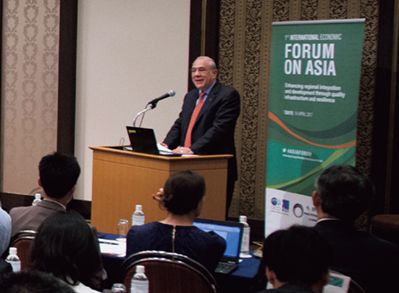
Mr. Angel Gurría, Secretary-General of OECD, delivering a speech at the First International Economic Forum on Asia jointly organized by Japan and the OECD in April 2017
In the process of drafting the 2030 Agenda for Sustainable Development, Japan has worked closely with the international community and led discussions towards the formulation of the new international development goals.
In 2016, Japan returned to the OECD Development Centre,(Note 11) which is a think tank in the OECD that carries out surveys and research regarding the development issues of developing countries. Not only the OECD member states but also emerging countries and developing countries that are not members of the OECD participate in the Centre. It plays an important role as a forum for policy dialogue on development in a variety of regions. Japan intends to actively cooperate with the Centre and take part in its activities, and to fulfill a role in further strengthening relations between the Centre and Asia. In April 2017, Japan co-organized the First International Economic Forum on Asia in collaboration with the OECD Development Center and the Economic Research Institute for ASEAN and East Asia (ERIA). At the Forum, participants engaged in discussions about quality infrastructure investment, circular economy, and sustainable cities. The participants also shared the recognition that it is important to increase the supply of quality infrastructure in accordance with international standards, in order to meet infrastructural demands in Asia, and therefore it is necessary to work closely in cooperation with the OECD.
B. Examples of partnership with regional organizations
The Association of Southeast Asian Nations (ASEAN) has positioned the strengthening of intra-regional connectivity as the highest priority, and established the ASEAN Community at the end of 2015, which is comprised of the “Political-Security Community,” “Economic Community” and “Socio-Cultural Community.” Japan has supported ASEAN's efforts to strengthen connectivity by making use of its experience with development of infrastructure and investment environment, based on the viewpoint that turning a more integrated ASEAN into a regional cooperation hub is essential for the region's stability and prosperity.
Building the ASEAN Community and the subsequent integration requires even greater initiatives to solve remaining various issues including strengthening intra-regional connectivity and narrowing development gaps. Japan will continue to advance proactive cooperation for the integration of ASEAN, while deepening the bonds of trust and friendship between Japan and ASEAN.
C. Partnership with other donors
Japan coordinates its development cooperation with that of other donors. In 2017, Japan held a high level development policy dialogue with the EU. Amid the decreasing trend of the overall ODA budget of major donors, it is becoming increasingly important to cooperate and collaborate with international organizations and other donors to effectively utilize the limited ODA budget and address development issues by the international community as a whole.
With respect to Japan's relationship with the United States, cooperation has also been advancing through the Japan-U.S. Economic Dialogue between Deputy Prime Minister Aso and Vice President Pence, which was agreed to launch by the two leaders in February 2017.
At the second round of the Japan-U.S. Economic Dialogue held in October 2017, the delegates affirmed that infrastructure projects in the Indo-Pacific region should be consistent with market competition and transparency, responsible financing arrangements, open and fair market access, and high standards of good governance. Furthermore, at the Japan-U.S. Summit Meeting held in November the same year, the leaders highlighted their commitment to cooperate on investment opportunities in energy, infrastructure, and other critical sectors to support development in emerging markets. They also shared the view that cooperation should take place between the relevant bodies that will jointly carry out infrastructure development in third countries.
Members of the Development Assistance Committee (DAC) of the OECD, the so-called traditional donor countries, have been taking a leading role in carrying out development cooperation in the international community. However, emerging donor countries such as China, India, Saudi Arabia, Brazil and Turkey also have had a significant influence in recent years on the development issues of developing countries.
This trend also appears within the framework of the G20. Consultation on development issues is now conducted not only by developed countries, but also with emerging and developing countries. Japan facilitates discussions by encouraging emerging donor countries to participate in various meetings in order to assist in aligning their development cooperation with other international efforts.
Japan has experienced transition from an aid recipient to a leading donor, and works with countries including emerging countries to promote triangular cooperation that supports South-South cooperation.
D. Proactive contribution to international discussions
Amid ongoing globalization, the extent to which countries in the world influence and depend on one another has rapidly increased. There are many threats and issues such as poverty, conflict, infectious diseases, and environmental problems, that concern not only a single country but also the whole international community, and require concerted efforts to tackle.
Since before the international community fully engaged in discussions, Japan had been leading in establishing a truly effective new agenda and its adoption as the 2030 Agenda for Sustainable Development by hosting the MDGs Follow-up Meeting, organizing informal policy dialogues, holding UN General Assembly side events, and proactively participating in the intergovernmental negotiations from 2015. The Sendai Framework for Disaster Risk Reduction 2015-2030 adopted in 2015 emphasizes the “mainstreaming of disaster risk reduction,” a concept that comprises the following three key points: positioning disaster risk reduction as a priority issue in policies by the respective governments; incorporating the disaster risk reduction perspective into all development policies and plans; and thereby expanding investment in disaster risk reduction. At the UN Special Thematic Session on Water and Disasters held in July 2017, Japan expressed its intention to promote international efforts to build national resilience. Japan will lead the international community mainly through the UN to realize a sustainable and resilient society by making full use of its knowledge.
Meanwhile, the OECD-DAC seeks to increase the quantity of assistance for developing countries and to enhance its efficiency, by strengthening collaboration with diverse actors engaged in development, such as emerging countries and the private sector, as well as through more effective mobilization and utilization of public and private finance. Specifically, discussions are underway on revision of measurement methods for the proper assessment of each country's ODA disbursements, and approaches to statistically capture a wide range of non-ODA development finance, including private sector investment and financing from emerging donor countries.
In addition, the Global Partnership for Effective Development Co-operation (GPEDC) has been engaged in efforts to increase not only the “quantity” of aid, but also to the effectiveness of aid (“quality”), in order to achieve international development goals including the SDGs.
At the Second High-Level Meeting of GPEDC in 2016, meaningful discussions were held on the effective contribution of development cooperation towards the achievement of the SDGs. In particular, the necessity of further utilizing private sector investment in development was affirmed. Furthermore, regarding triangular cooperation, which is one of the effective tools for the achievement of the SDGs, Japan explained its approach for effective implementation including cost sharing.
Japan has hosted the Asian Development Forum in cooperation with the Republic of Korea and other countries since 2010. At this Forum, participants discuss topics such as the effective use of ODA and how Asia's development experience can be applied to resolving development issues in and outside of Asia. They also form and disseminate “Asian voices” in response to international discussions about development.
- Note 11: Japan joined the OECD Development Centre at the time of the Centre's founding in 1962 but withdrew in 2000 due to issues including governance of the Centre. However, based on the improvements that have been observed with regard to the Centre's governance, as well as the increase in the number of new countries taking part, Japan decided to return to the Centre.
